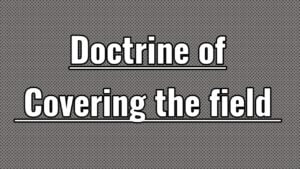The doctrine of covering the field is one of the important doctrines that is concerned with the making and regulation of laws in a state. In this article, i will explicitly explain the doctrine of covering the field with relevant court judgments and provisions of several laws, particularly the laws of Nigeria. If you have been searching the internet to know what the doctrine of covering the field is all about, this is the right article for you to read.
Apparently, Nigeria is a federation consisting of states and a Federal Capital Territory. Presently, Nigeria has thirty six states and federal capital territory, Abuja. The federal arrangement in Nigeria is premised on a distinctive division of powers of the federation between the central (federal) and state.
For the purpose of clearity, the 1999 constitution of Nigeria assigns to the federal government power over enumerated matters, leaving to the state government the residue of matters not so enumerated which are called “residual matters”. The enumerated matters under the constitution are specifically provided for in the body of the constitution and in the schedules to the constitution.
The constitution provides for two lists under which the legislative powers of the federation are exercisable. These are Exclusive legislative list and Concurrent Legislative list. The provision of an Exclusive list and Concurrent legislative list in the 1999 constitution starting with the 1954 Constitution, was taken from the constitution of the commonwealth of Australia, Section 109 which declare pro tanto, any state legislation which conflicts with any commonwealth Act on any matter in respect of which both the commonwealth and the state are empowered to make laws. This is what is now known as the “doctrine of covering the field”.

MUST READ:
- Problems and criticisms of democracy
- Pillars of democracy: 7 Essential pillars of democracy
- Why indirect rule succeeded in Northern Nigeria: See reasons
- How to start a blog and make money in school
- Exceptions to privity of contract rule
What Is The Doctrine of Covering The Field?
The doctrine of covering the field can arise in two distinct situations. First, where in the purported exercise of the legislative powers of the National Assembly or a State House of Assembly, a law is enacted which the constitution has already made provisions concerning the subject matter of the Federal Act or State law.

Secondly, where a state House of Assembly, by purported exercise of its legislative powers enacted a law which an Act of the National Assembly has already made provisions covering the subject matter of the State law. In both situations, the doctrine of covering the field will apply because of the “federal might” which relevantly are the constitution and the Act.
Constitutionally, both the federal and state government can validly make laws on matters enumerated in the concurrent legislative list. However, where the federal government enact a law which expressly or impliedly covers the whole gamut of a subject matter contains in the concurrent legislative list, the state cannot enacts its own law to co-exist with the federal law on the same subject matter.
Historically, the doctrine of covering the field is attributed to the decision of Australian Courts. The doctrine first came into force in the case of Clyde Engineering Company Ltd v Coburn. In this case, the court held that:
“if a competent legislature expressly or impliedly evinced its intention to cover the whole field that is a conclusion test of inconsistent where another legislature assumed to enter to any extent upon the same field… The inconsistency is demonstrated, not by comparison of detailed provisions, but by the mere existence of the two sets of provisions”
The locus classicus of the doctrine is however the dictum of Dixon J in the Australian case of Ex Parte McLean where he observed that:
“When the parliament of the commonwealth and the parliament of a state each legislate upon the same subject and prescribe what the rule of conduct shall be, they make laws which are inconsistent, notwithstanding that the rule of conduct is identical which each prescribes and section 109 applies. That this is also settled, at least, when the sanctions they impose are diverse (Hume v Palmer (1926) 38 CLR 441). But the reason is that, by prescribing the rule to be observed, the Federal statute shows an intention to cover the subject matter and provides what the law upon it shall be.
If it appeared that the Federal law was intended to be supplementary to or cumulative upon state law, then no inconsistency would be exhibited in imposing the same duties or inflicting different penalties. The inconsistency does not lie in the mere co-existence of the two laws which are susceptible of simultaneous obedience. it depends upon the intention of the paramount legislature to express by its enactment, completely, exhaustively, what shall be the law governing the particular conduct or matter to which its attention it directed. When a federal statute discloses such an intention, it is inconsistent with it for the law of a state to govern the same conduct or matter.”

ALSO READ: List of political parties in Nigeria before Independence
Even in Canada, where no Section corresponding to section 109 of the Australian Constitution exist, but where by reason of exclusive field of legislation, conflict may arise between the National and the provincial legislation, the Privy Council in the case of Attorney General of Ontario v Attorney General of the Dominion of Canada enunciated a rule of interpretation which in practical effect corresponds with section 109 of the Australian Constitution.
In Nigeria, the Courts have adopted the doctrine of covering the field as enunciated by the Australian Court above. In the case of Attorney General of Abia State v Attorney General of the Federation, the Supreme Court considered the doctrine and held thus:
The doctrine of covering the field is attributed to the Australian courts. Substantively, it amounts to this. When a law, if valid, would alter, impair or detract from the operations of the law of the commonwealth parliament, then to that extent it is invalid.
Moreover, if it appears from the terms, the nature or the subject matter of a Federal enactment that it was intended as a complete statement of the law governing a particular matter set of rights and duties, then for a state law to regulate or apply to the same matter or relation is regarded as a detraction from the full operation of the commonwealth law and so is inconsistent.

In the same case, Ogundare, JSC also quoted with approval from the Privy Council case of O’Sullivan v. Noarlunga Meat Ltd thus:
“The inconsistency does not lie in the mere co-existence of two law which are susceptible or simultaneous obedience. It depends upon the intention of the paramount legislative to express by its enactment, completely, exhaustively, or exclusively, what shall be the law governing the particular condition or matter to which its attention is directed. When a Federal Statute discloses such an intention, it is inconsistent with it for the law of a statute to govern the same condition or matter“.

MUST READ: 21 Leading Cases in the law of contract you must know
In the same vain, the doctrine of covering the field also extend to any inconsistency that may arise between an Act of the National Assembly or a law of the House of Assembly of a State and any of the provisions of the Constitution. Thus where the constitution has enacted expressly or impliedly exhaustively on any subject matter neither the National Assembly nor the House of Assembly of a state can Validly legislate on the same subject matter.
Although, the constitution does not state that an Act of the National Assembly cannot duplicate the provisions of the constitution, by judicial interpretation, verging on policy, the consequence of such duplication has been variously described as “imperative“, “in abeyance“, “suspended“. However, it is described, where the constitution has covered the field as to the law governing any conduct, the provision of the constitution has covered the is the authoritative statement of law on the subject.
The constitution would not have “covered the field” where it has expressly reserved to the National Assembly or other legislative body the power to expand or to add to its provisions in regard to the particular subject. Where the constitution has provided exhaustively for any situation and on any subject, a legislative authority that claims to legislate in addition to what the constitution had enacted must slow that, and how, it has derived its legislate in addition to what the constitution had enacted must show that, and how, it had derived its legislative authority to do so from the constitution itself.

MUST READ:
- Features of democracy: Essential features of democracy
- Donoghue v Stevenson: Facts, Issues and Decision of the court
- How to become a successful lawyer in Nigeria
- Characteristic of a good constitution
- Achievements of the military in Nigeria
Conclusion
In my view, the doctrine of covering the view is a very important and inevitable doctrine because it helps to stop a situation where there will be two conflicting law existing in a country at the same time. Based on this, I am also of the opinion that the judgements of the judiciary in the above cases are actually correct and should the followed by subsequent judgments in future. Okay! This is all I have to share on the doctrine of covering the field. Nonetheless, this blog is open to contributes and comments. I would love to hear your opinion about the doctrine of covering the field. Do you think it is a doctrine that should be continued or not?

Edeh Samuel Chukwuemeka, ACMC, is a lawyer and a certified mediator/conciliator in Nigeria. He is also a developer with knowledge in various programming languages. Samuel is determined to leverage his skills in technology, SEO, and legal practice to revolutionize the legal profession worldwide by creating web and mobile applications that simplify legal research. Sam is also passionate about educating and providing valuable information to people.
Good work
Pls I don’t really understand what the court held in the case of Clyde engineering company LTD v cowburn
N also if you can vivdly explain what this doctrine of covering the field is that would be nice